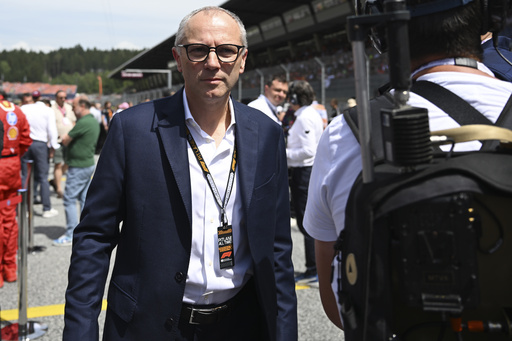
NAIROBI, Kenya — Paul Kagame, the president of Rwanda, is showcasing ambitious aspirations that stretch far beyond his landlocked nation in Central Africa. Recently, he has set his sights on hosting a Formula 1 Grand Prix, a striking ambition for a country that endured genocide just three decades ago but now considers itself a leader on the African continent.
Kagame’s strategy encompasses a blend of political, diplomatic, and economic maneuvers aimed at elevating Rwanda’s status as a significant player in Africa. Over the past four years, he has dispatched troops to tackle insurgents in the Central African Republic and engage in operations against rebellious groups in Mozambique. Domestically, he has implemented economic reforms designed to attract foreign investments, earning Rwanda a reputation as one of Africa’s least corrupt and most inviting nations for business, despite Kagame’s own controversial stance on democracy.
His ambitions in the sports arena greatly extend beyond the continent as well. Since 2018, the Rwandan government has established sponsorships with prominent European football clubs, formed a partnership with the NBA, and invested extensively in enhancing the country’s sporting infrastructure. Next year, Rwanda is set to host the World Championships for bicycle road racing, further emphasizing its growing visibility in international sports.
Kagame has nurtured a robust partnership with Gianni Infantino, FIFA’s president, who has facilitated the establishment of a FIFA office in Rwanda, even holding the organization’s annual meeting in the country last year. Now, Rwanda is taking strides toward its bold vision of hosting a Formula 1 race, as F1 officials have confirmed they are engaged in discussions with Kagame’s administration regarding this possibility.
However, logistical and financial hurdles loom large. The nation’s current Gross Domestic Product is $14.1 billion, and without a designated racetrack, the feasibility of an F1 event may appear unlikely. Yet, as seven-time world champion Lewis Hamilton advocates for an African F1 venue, Rwanda’s stable reputation makes such ambitions plausible.
Stefano Domenicali, the CEO of Formula 1, has acknowledged the seriousness of Rwanda’s proposal, noting that they have submitted an impressive plan. He emphasized the necessity for appropriate investments and strategic planning to facilitate an African Grand Prix.
The motorsport scene in Rwanda could witness significant growth when the FIA holds its upcoming annual assembly in Kigali this December, marking the first time the event occurs on the African continent. While exact details of the exploratory discussions remain under wraps, Rwandan government spokesperson Yolande Makolo asserts that hosting an F1 event would signify a shift from mere sports consumption to active participation in the sports industry. She stated that Rwanda’s pursuit of Formula 1 aligns with its broader strategy to harness sports for transformative progress.
Rwanda is not the only African nation eyeing a Formula 1 race. South Africa, which hosted the continent’s last Grand Prix in 1993, and Morocco, which held 13 races from 1925 to 1958, are also reportedly interested in reclaiming their place in F1 racing.
Kagame’s efforts underline a view of sports as an avenue for economic and geopolitical influence. By successfully navigating inherent economic challenges, Rwanda could reap considerable diplomatic and financial rewards, akin to how the Seoul Olympics in 1988 helped reshape South Korea’s global standing.
While Rwanda’s strategy is unique in its ambition, it appears reminiscent of nations like Saudi Arabia, Bahrain, and Qatar, which have leveraged sports, such as F1 races, to elevate their international profiles. Nonetheless, Kagame’s approach has garnered scrutiny, particularly regarding his administration’s human rights practices.
Kagame, who claimed 99.2% of the votes in the recent presidential election, faces allegations of employing oppressive tactics to maintain his longstanding regime. Critics of his ruling party have reported instances of intimidation and violence, and the United Nations has accused Rwanda of supporting insurgencies in the Democratic Republic of Congo, prompting a reduction in U.S. military aid in response.
Skepticism surrounds Rwanda’s partnerships in sports, with allegations of “sportswashing” aimed at masking the government’s human rights violations. U.S. Senators have voiced concerns regarding the NBA’s involvement with Rwanda, while European lawmakers have criticized the partnerships of Rwandan sponsorships with top football clubs, arguing such connections aim to attract tourism at the expense of human rights awareness.
The suggested Formula 1 race has reignited these critiques, raising questions about the due diligence undertaken by F1 to ensure adherence to human rights commitments in their collaborations with Rwanda. Critics have urged that partners must recognize the human rights violations occurring under Kagame’s administration.
Rwanda is by no means the only nation with a troublesome human rights history utilizing sports to construct an alternative narrative. Saudi Arabia, facing backlash for the assassination of journalist Jamal Khashoggi, has dedicated over $10 billion to various sports. Qatar, maintaining commercial ties with Rwanda, has also heavily invested in hosting global sporting events, notably the FIFA World Cup.
Yet the financial backdrop of Rwanda casts doubt on the viability of such strategies. It remains a comparatively impoverished nation, reliant on foreign aid to meet about 40% of its government expenditure, raising valid concerns about the prudence of following in the footsteps of affluent Gulf states.
The significant financial risks associated with Kagame’s sports strategy are unmistakable. Despite Rwanda’s favorable business climate, attracting substantial investment has proven challenging, and the hosting of high-profile sporting events could address this shortfall while giving the nation a competitive edge over its African counterparts.
Conversely, even wealthier nations have faced difficulties in making hosting such events financially beneficial. Experts caution that the enormous costs associated with staging sporting events often result in negative net impacts, a concern that looms large for economically fragile Rwanda.
